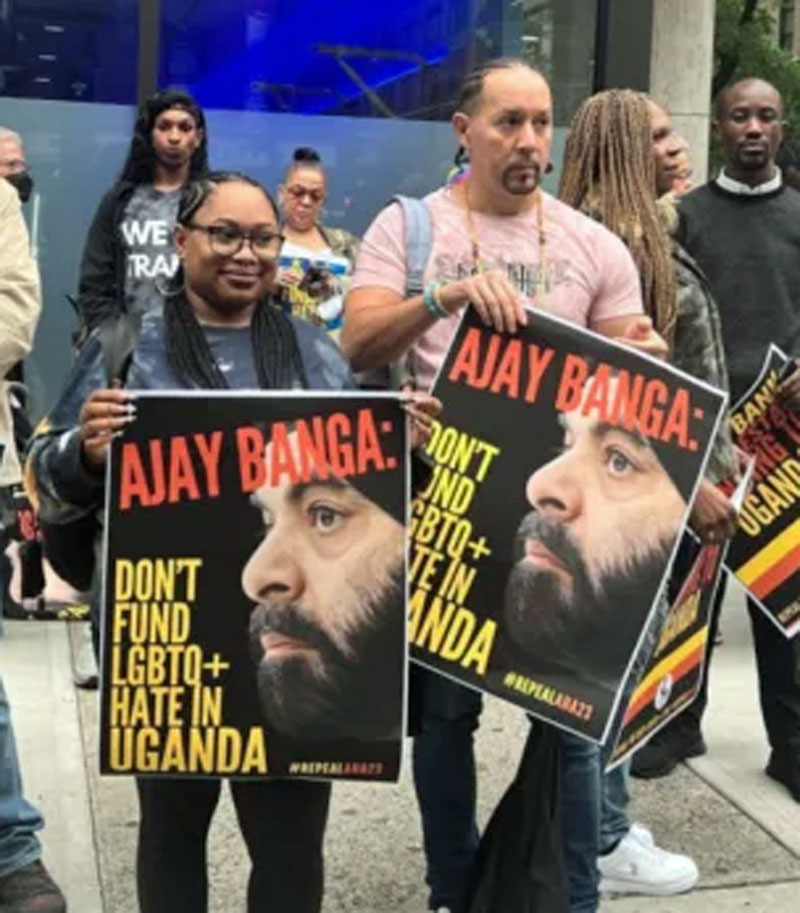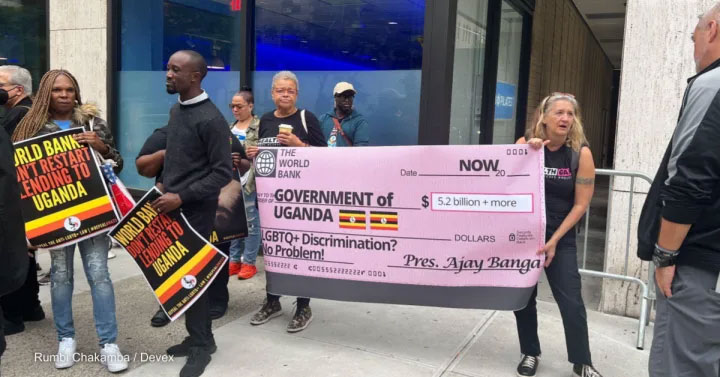LGBTQ+ activists protest World Bank’s work toward resumed lending to Uganda
Colin Stewart is a 45-year journalism veteran living in Southern…
World Bank halted lending in 2023 after Uganda enacted its repressive Anti-Homosexuality Act

Activists are outraged that the World Bank is moving forward with plans to restart lending to Uganda without adequate measures to protect people from discrimination, especially the harsh, repressive, homophobic Anti-Homosexuality Act, which was enacted last year.The World Bank halted lending to Uganda last year in response to that new law..
The online publication Devex.com, which focuses on global development, reported:
LGBTQ+ activists protest World Bank’s plan to resume lending to Uganda
By Rumbi Chakamba
LGBTQ+ and human rights activists gathered a few blocks away from Uganda’s United Nations Permanent Mission in New York on [Sept. 26] to protest the World Bank’s plans to resume financing to the country, despite its enforcement of one of the harshest anti-LGBTQ+ laws in the world.
The protest comes one year after the World Bank halted new loans to Uganda following the signing of the controversial law, which imposed severe penalties on LGBTQ+ individuals — including life imprisonment and, in some cases, the death penalty.
Activists said they are outraged that the World Bank is moving forward with plans to restart lending to Uganda without adequate measures to protect people from discrimination. Protesters, including Ugandans directly impacted by the law, called the decision “disastrous” and accused the World Bank of disregarding its own anti-discrimination policies.
Uganda risks losing hundreds of millions of dollars in funding after it passed a law that critics say will criminalize LGBTQ+ relationships.
“There can be no business as usual between the World Bank and the Government of Uganda while this law remains in force,” said Clare Byarugaba of Chapter Four Uganda, a local human rights organization in a statement. “We are gravely concerned that President Banga is turning his back on us, and breaking his commitments to ensuring non-discrimination.”

But the World Bank said it worked carefully on mitigation measures that are being rolled out. The measures include a bank-supported independent monitoring mechanism and capacity building of project implementation units and are fully in line with its Environmental and Social Framework. According to the bank, they conducted consultations with people affected to ensure that their voices would be heard.
The bank said it has yet to set a date to assess the effectiveness of the measures, as it is currently working with the government of Uganda to implement them.
But more than 115 organizations have already rejected these measures as inadequate, in an open letter to Banga. Activists instead want the World Bank to maintain its freeze on loans until Uganda’s government reverses the law and guarantees the safety of LGBTQ+ individuals. They warn that resuming lending without these assurances could encourage further human rights violations in the country.
“The World Bank’s so-called ‘mitigation measures’ are a façade, designed to provide the illusion of protection,” said Richard Lusimbo of Convening for Equality, who also serves as director general of Uganda Key Population Consortium. “They rely on perpetrators of discrimination — the government of Uganda — to implement the measures fairly. How can they be taken seriously?”
The World Bank is Uganda’s largest source of concessional funding, with a portfolio of $5.4 billion as of December 2022.




